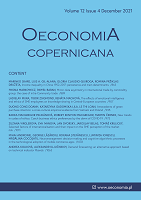Impact of enterprise ambidexterity capability and experience learning on cross-border M&A performance: evidence from China
Impact of enterprise ambidexterity capability and experience learning on cross-border M&A performance: evidence from China
Author(s): Junshu DU, Yichen Peng, Yuansong Tong, Yuriy BilanSubject(s): Economy, Business Economy / Management
Published by: Instytut Badań Gospodarczych
Keywords: ambidexterity capability; experience learning; cross-border M&A; institutional distance; M&A performance
Summary/Abstract: Research background: Through cross-border mergers and acquisitions (M&A), enterprises in China can improve their technological innovation and organizational management capabilities to make up for the disadvantages of outsiders and enhance their international competitiveness. However, due to the lack of experience, the success rate of cross-border M&A of China enterpris-es is low, and the performance changes after M&A differ. How to maximize the advantages of cross-border M&A in obtaining technical resources and how to improve the performance of cross-border M&A are important issues that China’s cross-border M&A enterprises and academic circles need to solve. Purpose of the research: The aim of this study is to analyze the mechanism and boundary condi-tions of firms’ capability to exploit resources (RTC) and capability to explore resources (REC) with regard to cross-border M&A performance from the perspective of experience learning based on organizational learning theory and resource-based theory. Methods: With 173 China A-share listed companies with cross-border M&A events from 2010 to 2020 as samples, this study uses hierarchical regression analysis to test the impact of REC and RTC on cross-border M&A performance and its mechanism. In the robustness test, this study adopts the measures of changing dependent and independent variables lagged for one year for analysis. In the mechanism test, this study uses intermediary and mediation effect models. Findings & value added: The results show that RTC and REC have positive effects on the per-formance of cross-border M&A. Prior experience learning (PE) and vicarious experience learning (VE) increase the probability of companies making cross-border M&A decisions and have posi-tive effects on cross-border M&A performance. Moreover, PE and VE play a partial mediating role in the positive impact of REC and RTC on cross-border M&A performance, respectively. Formal and informal institutional distance weaken the positive effects of REC and RTC on the performance of cross-border M&A. Enterprises in emerging economies should adapt to the insti-tutional environment of the host country to reduce the negative impact of institutional distance while taking advantage of experience learning when carrying out cross-border M&A.
Journal: Oeconomia Copernicana
- Issue Year: 13/2022
- Issue No: 4
- Page Range: 1177-1214
- Page Count: 38
- Language: English

